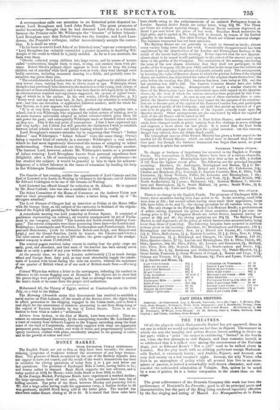A correspondent calls our attention to an historical point disputed
be- tween Lord Brougham and Lord John Russell. The great promoter of useful knowledge thought that he had detected Lord John in a blunder, because the Premier calls Mr. Wilderspin the " founder " of Infant Schools: Lord Brougham says that Robert Owen was the founder; and Lord Lans- downe, the Premier's colleague, rather inconsiderately accepts the correc- tion. It is itself an error.
"In his haste to convict Lord John of an historical error," says our correspondent, "Lord Brougham has certainly committed a greater injustice, in depriving Wil- derspin of the credit to which he is justly entitled. As far as I can ascertain, the facts were these.
"Oberlin collected young children into large rooms, and by means of women called conductrices,' taught them to read, to sing, and amused them with pic- tures. Robert Owen's jinmary object appears to have been to keep the young children out of mischief while their parents were at work: they went through some bodily exercises, including measured dancing to a fiddle, and probably some in- struction was given them also.
"The establishments in London were of the natal* of asylums for children of the very lowest class, varying from two to eleven years of age. Wilderspin' whose thoughts had previously been directed to the instruction of the young, took charge of the second of these establishments; and it was here that he developed, little by little, as circumstances required and experience suggested, the system of infant train- ing, of which he is the author. In his own words, (Early Discipline, p. 9,) 'Every week and day and hour had, in fact, directed our attention to something new; and thus one invention or application followed another, until the whole In- fant System, as it now appears, was evolved.' "It is of very little consequence who first collected infants together into a school; but it was Wilderspin who originated the infant system of training, now in its main features universally adopted in infant schools—which gives them life and power for good; and consequently Wilderspin made or founded infant schools as they are. This is the real point of consequence. I fear I have expressed my- self very badly; but I think you will perceive the distinction I wish to establish infant nfant schools in name and infant training schools in reality." Lord Brougham's counter-mistake lay in supposing that Owen's "Infant School" and Wilderspin's "infant School" were the same thing: Owen's being a superior kind of custody in a nursery; Wilderspin's a real school, which he had most ingeniously discovered the means of adapting to infant understanding. Owen founded one thing, no doubt; Wilderspin another. The learned Lord, however, admits Mr. Wilderspin's merits as a promoter Of infant training: Lord Brougham knows from personal experience how delightful, after a life of unremitting energy, is a retiring allowance—he has studied the subject: it would be graceful in him to back his acknow- ledgment of a fellow labourer in the cause of education by lending his help to the Wilderspin Testimonial.


























 Previous page
Previous page